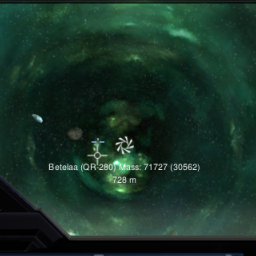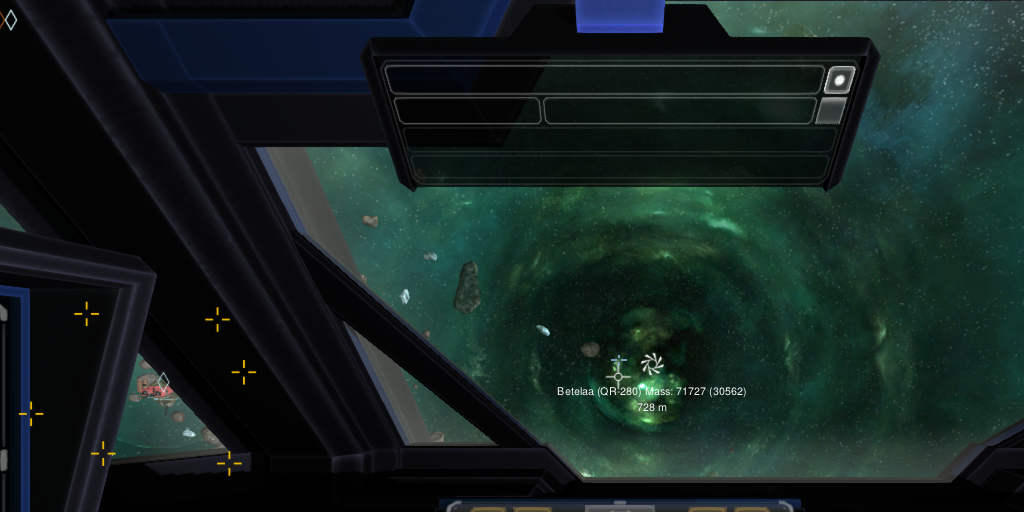Difference between revisions of "Rift"
m (→Notice) |
|||
| Line 50: | Line 50: | ||
---- | ---- | ||
===Notice=== | ===Notice=== | ||
| − | If you enter a rift without the ability to create another rift on the other side to return you to the original system, it may be very difficult to get back again, if ever! Be sure to use the [[Holotable]] or [[Rift Generator]] controls to learn about the star system you are traveling to; find out if it has a "Rift Hub" station. Alternatively, on a larger ship, install your own rift generator and maintain a stock of fuel for it. There is a random chance you may discover a (spawned) station which contains a Rift Generator on it, but relying on this chance | + | If you enter a rift without the ability to create another rift on the other side to return you to the original system, it may be very difficult to get back again, if ever! Be sure to use the [[Holotable]] or [[Rift Generator]] controls to learn about the star system you are traveling to; find out if it has a "Rift Hub" station. Alternatively, on a larger ship, install your own rift generator and maintain a stock of fuel for it. There is a random chance you may discover a (spawned) station which contains a Rift Generator on it, but relying on this chance is inadvisable. |
---- | ---- | ||
Latest revision as of 03:55, 18 January 2017
| Rift | |
|---|---|
 | |
| Rift | |
| A tear in space used to travel great distances. | |
| HUD Icon, "Sawblade" | |
| Category: Travel | |
Description
When a Rift Generator is used successfully with Xanthium, a rip in the fabric of space/time, or rift, is created. Due to the rift being a tear in three dimensional space, the rift appears as a shimmering sphere. Every rift is a temporary event, and can only support a limited amount of mass entering before it will collapse. Creating and entering rifts allows a pilot to travel from one star to another, instantly. Trying to warp to another star, even at the highest warp factor would take a tremendous amount of time and energy otherwise. A rift has often been described as taking two very distant objects on a sheet of paper, and folding the paper together to the objects touch. Piercing the paper with a pencil point is the rift, and it touches both places, even though they are technically a very long distance apart.
Usage
Entering a rift does not require any speed or energy; simply entering it will transport a ship and its contents instantly to the location on the other side of the rift, as long as the rift has sufficient mass left before collapsing. Always get the correct actual mass of your ship plus cargo before opening a rift or you may not be able to enter, wasting valuable Xanthium. Similarly, don't open too large of a rift, it wastes valuable resources and may allow an enemy to follow you through to the other star.
Creating a Rift
The spatial Rift Generator is a massive device that requires one of the three forms of Xanthium and 1,000,000 power to operate. This fuel comes in 3 variants from a basic form for small ships, to an advanced and more expensive form for entire fleets; Xanthium, Di-Xanthium and Tetra-Xanthium. Each of these fuel variants can be bought in limited quantities as well as refined.
- Xanthium is the basic rift fuel and is used to generate rifts for small ships (Up to 100,000 mass).
- Di-Xanthium is the second tier and rated for medium ships (Up to 1,000,000 mass).
- Tetra-Xanthium is the highest tier and rated for large ships and fleets (Up to 10,000,000 mass).
To refine Xanthium you need the following materials:
- Xanthium (x100) = Beryllium + Deuterium + 100 Nitrogen
- Di-Xanthium (x100) = 100 Xanthium + 1 Mercury + 100 Nitrogen
- Tetra-Xanthium (x100) = 100 Di-Xanthium + 1 Osmium + 100 Nitrogen
Once generated, a spatial rift will remain in space until the mass it can support has traversed it, or it has decayed over time (minutes), at which point it will collapse and disappear. Whenever a ship passes through a rift its mass will be subtracted from the total mass rating of the rift. Rifts are also independent from the ship that generates them. Once generated, any ship can pass through a rift until the mass is used or it has completely decayed. Rifts will also remain in the world when the ship that generated it is destroyed.
Cockpit HUD Display
The rift appears as a small circle with directional rays coming off of it in your pilot's HUD. If the icon is white, your current ship mass will successfully travel through the rift. If it is red, your ship mass is too great for the rift, and attempting to enter the rift will collapse it.
In this image, the ship HUD indicates that this rift is 728 meters from the ship, the Betelaa (QR-280) star is detected on the other side of it, and that 30,562 mass of 71,727 original mass remains before this rift will collapse instantly, or in a few minutes from natural decay. Because the rift "sawblade" icon is white, this ship can successfully travel through this rift.
Notice
If you enter a rift without the ability to create another rift on the other side to return you to the original system, it may be very difficult to get back again, if ever! Be sure to use the Holotable or Rift Generator controls to learn about the star system you are traveling to; find out if it has a "Rift Hub" station. Alternatively, on a larger ship, install your own rift generator and maintain a stock of fuel for it. There is a random chance you may discover a (spawned) station which contains a Rift Generator on it, but relying on this chance is inadvisable.
